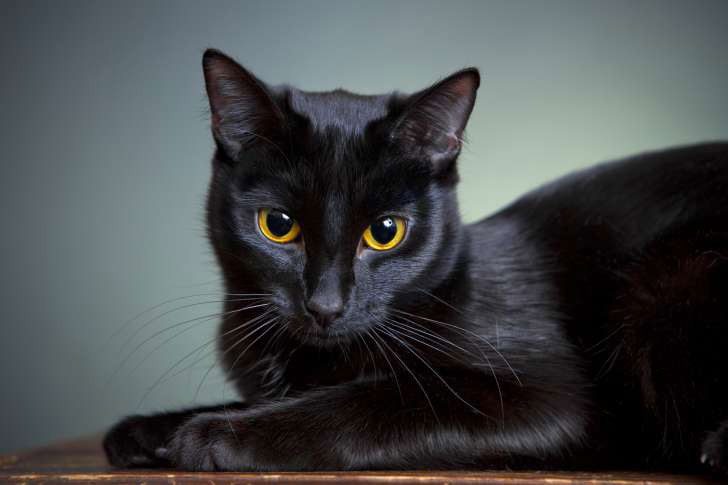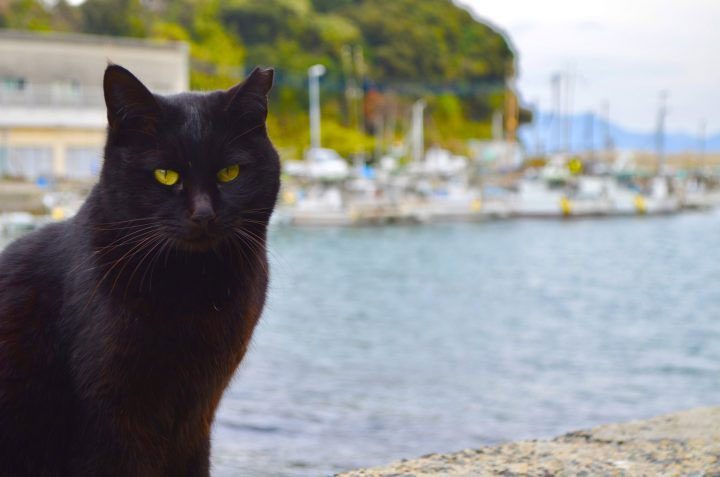Everyone says that when a black cat crosses your path, misfortune is sure to follow. But have you ever wondered how black cats got such a bad reputation? Is it simply due to their fur color, or is there something genuinely ominous about them?
Many still believe that seeing a black cat brings bad luck. However, in Vietnam, we do not have any beliefs related to black cats.

In Vietnam, we do not have beliefs related to black cats.
The answer lies in two words: “Culture”
Scientifically, a black cat is simply a cat with black fur. The source of that color is entirely due to pigments, and there are up to 22 cat breeds with black fur. Generally, male cats tend to have more pigmentation that leads to black fur than female cats.
The bad reputation of black cats comes from Western culture
In Western history, black cats have been regarded as symbols of evil and misfortune. In most European countries, they are seen as embodiments of bad luck. A black cat crossing your path is synonymous with impending disaster, even death.
Thousands of years ago, all cats, regardless of their fur color, lived quite comfortably in ancient Egypt. Here, anyone who killed a cat would face the death penalty. However, a few millennia later, Christianity spread throughout Europe. Christianity viewed cats as harbingers of misfortune.

Christianity viewed cats as harbingers of misfortune.
In 1233 AD, Pope Gregory IX nailed the final nail in the coffin for black cats when he declared that black cats were incarnations of the devil. With this declaration, Christians hunted down black cats and burned them at festivals to punish their supposed demonic nature. The situation became so dire that by the 14th century, cats were nearly extinct in some parts of Europe.
In the following centuries, the belief that black cats were associated with the devil naturally developed, leading to black cats being seen as witches. According to superstitious people, black cats were believed to be witches in disguise. Others claimed that black cats could actually become witches after being part of a witch’s circle for seven years. By the 16th and 17th centuries, anyone who owned a black cat was enough to be considered a witch and sentenced to death.
Ironically, these superstitions about black cats have persisted to this day, despite being nothing more than a source of misfortune for the cats themselves.
Not Everywhere Are Black Cats… “Black”
When viewed through the lens of other cultures, the perception of black cats is entirely different. For instance, in ancient Egypt, the image of the goddess Bastet, who has a head resembling that of a black cat, speaks volumes about the status of these animals in ancient Egyptian culture.
Egyptians revered cats, partly due to their hunting prowess. Mice, snakes, and other pests that humans detest were easily dealt with by cats.

The Scottish have long believed that the appearance of a black cat brings prosperity to the household.
Additionally, cats kept in noble households led incredibly lavish lives: adorned with gold and dining alongside people. Even in death, they were mummified and buried like wealthy individuals. Archaeologists have discovered thousands of years’ worth of relics of black cats in an Egyptian tomb.
Not only ancient Egyptians, but the Scottish have long believed that the presence of a black cat brings prosperity and success to the household.
Meanwhile, the Japanese consider it lucky to see a black cat crossing their path.
In the past, many sailors would bring black cats along, believing they served as good luck charms, protecting them from dangers at sea. Scottish fishing families also kept black cats, hoping they would bless their households.
The omen of a black cat, whether good or bad, has no definitive answer; it entirely depends on the culture of each country and each group of people. So don’t let yourself feel anxious just because of the eerie tales surrounding them.
Because as you can see, there are still beliefs where people revere black cats, and they encounter black cats all the time without any issues.





















































